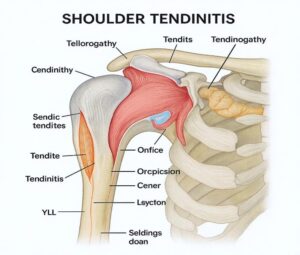
If you’ve experienced lingering shoulder pain or limited mobility after receiving a flu shot or tetanus vaccine, you’re not alone. What many people don’t realize is that improper administration of vaccines can lead to serious shoulder injuries—including tendinitis and tendinopathy—conditions and injuries that may be compensable under the National Vaccine Injury Compensation Program (VICP).
What Is SIRVA?
SIRVA is an acronym for Shoulder Injury Related to Vaccine Administration. It generally occurs when a vaccine is injected too high or too deep into the shoulder joint rather than the deltoid muscle. This can cause the needle to penetrate sensitive structures such as the bursa, tendons, or joint capsule, leading to significant inflammation and injury.
One of the consequences of this misadministration can be tendinitis or tendinopathy.
Understanding Tendinitis and Tendinopathy
Tendinitis is inflammation of a tendon, the fibrous tissue that connects muscle to bone. Tendinopathy is a broader term that includes both inflammation and degeneration of the tendon. In the context of SIRVA, these injuries often affect the rotator cuff tendons, which are essential for shoulder movement and stability.
Symptoms may include:
- Persistent shoulder pain starting within 48 hours of vaccination
- Pain that worsens with arm movement
- Reduced range of motion
- Weakness or stiffness in the shoulder
- Difficulty sleeping and performing daily activities like dressing or reaching overhead
How Tendinitis and Tendinopathy Develop After a Flu or Tetanus Shot
Flu and tetanus shots are commonly given in the upper arm, but if the injection is placed too high—near the shoulder joint—it can penetrate areas where tendons are located. This can directly irritate or damage the rotator cuff tendons, leading to inflammation (tendinitis) or degenerative changes (tendinopathy).
Even a small error in injection technique can result in:
- Direct trauma to the supraspinatus tendon
- Inflammatory responses in surrounding soft tissue that can trigger acute or chronic inflammation
- Long-term shoulder dysfunction

Recognizing the Symptoms of Post-Vaccine Tendinitis
If you experience the following symptoms shortly after receiving a flu shot or tetanus booster, you may be suffering from tendinitis or another SIRVA-related injury:
- Persistent shoulder pain not improving within a few days
- Pain that worsens with arm movement or lifting
- Swelling or tenderness near the injection site
- Decreased range of motion or difficulty raising the arm
You May Be Eligible for Compensation
If your tendinitis or tendinopathy was caused by an improperly administered vaccine, you may qualify for compensation through the National Vaccine Injury Compensation Program (VICP). This federal program provides financial support to individuals injured by certain vaccines, including the flu and tetanus vaccines.
At Cinelli Adoff, LLP, we have extensive experience representing clients in SIRVA cases. Our team understands the complexities of these claims and can help you gather the medical evidence necessary to support your case and navigate the VICP process efficiently and effectively.
Why Choose Us for Your SIRVA Claim?
- Proven Track Record: We’ve helped numerous clients nationwide recover compensation for shoulder injuries caused by vaccines and we are experienced and well versed in the VICP.
- No Out-of-Pocket Fees: We charge no fees and will pay the necessary costs to litigate your case such as filing fees, medical record retrieval fees, expert fees, etc.
- Compassionate Advocacy: We’ll work with you and your medical providers and support you every step of the way.
Contact Us Today for a Free Case Review
If you or a loved one developed shoulder tendinitis, tendinopathy, or any other SIRVA-related injury after a flu shot or tetanus vaccine, don’t wait. These injuries can worsen over time and significantly impact your quality of life.
Call Cinelli Adoff LLP at (716) 815-4722 or fill out our online contact form to schedule your free consultation. Let us help you get the compensation you deserve.

Leave a Reply
You must be logged in to post a comment.